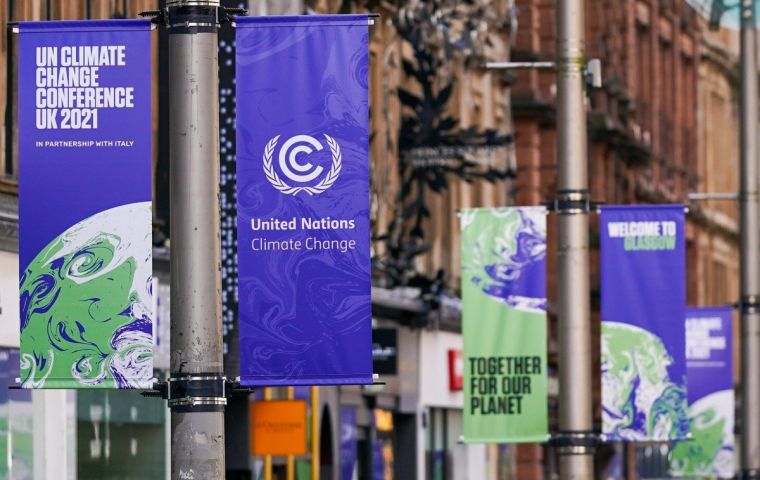MercoPress. South Atlantic News Agency
COP26 Finance Delivery Plan still short of the US$ 100bn agreed by developed countries
 In 2009, developed countries agreed to mobilize US$100 billion in climate finance per year by 2020, and in 2015 agreed to extend this goal through to 2025
In 2009, developed countries agreed to mobilize US$100 billion in climate finance per year by 2020, and in 2015 agreed to extend this goal through to 2025 The UK COP26 Presidency has published a Climate Finance Delivery Plan to provide clarity on when and how developed countries will meet the US$ 100 billion climate finance goal pledged.
Based on the analysis from the Organization for Economic Cooperation and Development (OECD), the delivery plan shows that developed countries will make significant progress towards the US$100 billion goal in 2022, and provides confidence that it will be met in 2023. The data also provides confidence that developed countries can mobilize more than US$100 billion per year thereafter through to 2025.
Climate finance plays a critical role in helping developing countries fight climate change and adapt to its impacts. In 2009, developed countries agreed to mobilize US$100 billion in climate finance per year by 2020, and in 2015 agreed to extend this goal through to 2025. While developed countries have significantly scaled-up their support over the last decade, new analysis shows the US$ 100 billion goal was unlikely to have been met in 2020 and is likely to also fall short in 2021 and 2022.
Ahead of COP26, COP President-Designate Alok Sharma asked Jonathan Wilkinson, Canada’s Minister of Environment and Climate Change and Jochen Flasbarth, Germany´s State Secretary at the Ministry for Environment, Nature Conservation and Nuclear Safety, to work together to produce a Delivery Plan on the US$100 billion commitment, to demonstrate how and when developed countries will deliver on their promise.
Building on assessments of progress on the US$ 100 billion goal to date, the Delivery Plan sets out an estimated trajectory of climate finance from 2021 through to 2025 - taking into account new climate finance pledges from individual developed countries and multilateral development banks. It also sets out principles on how to improve the delivery of climate finance.
Whilst it is disappointing that the goal has not been met so far, the redoubling or significantly increased efforts from a large number of developed countries - including the UK, Canada, Germany and others – means we are now much closer to the target and are delivering funds to support countries on actions against climate change.
Private climate finance has also underperformed against expectations, the plan makes clear that more needs to be done in this respect, but does not rely on a significant improvement in this for the goal to be met by 2023.
Furthermore, based on consultations undertaken by Minister Wilkinson and State Secretary Flasbarth, additional pledges from developed countries may be expected this year but are not yet ready to be included in the analysis at the time of publishing. These are likely to further increase the projections outlined in the report.
The Plan lays out a set of guiding principles for collective actions of developed countries, including increasing financing for adaptation, addressing barriers in accessing climate finance, and improving private finance mobilization.
Developed countries will continue to engage with developing countries and with civil society to ensure climate finance is delivered effectively, efficiently and at scale.
The OECD supported the work on this Delivery Plan with its expert analysis that provides aggregate, forward-looking estimates of an increase in climate finance from 2021 to 2025.
Climate finance will be key at COP26 in Glasgow later this month. Providing clarity on the timing and sources of funding is only the first step on the path towards delivery. Robust conversations will continue at COP26 on ways to ensure countries are collectively doing what is needed to deliver on the goals of the Paris Agreement.
COP26 President-Designate Alok Sharma said the Delivery Plan sets out how developed countries will deliver the US$ 100 billion goal that has long been promised to developing nations.
“Scaling up climate finance has been one of my top priorities as COP President. This plan recognizes progress, based on strong new climate finance commitments. There is still further to go, but this Delivery Plan, alongside the robust methodological report from the OECD, provides clarity, transparency and accountability. It is a step towards rebuilding trust and gives developing countries more assurance of predictable support.
”We can and must do more to get finance flowing to developing nations. So in the lead up to COP26, it’s vital we see further pledges from developed countries and action on key priorities such as access to finance and funding for adaptation”.




Top Comments
Disclaimer & comment rulesCommenting for this story is now closed.
If you have a Facebook account, become a fan and comment on our Facebook Page!